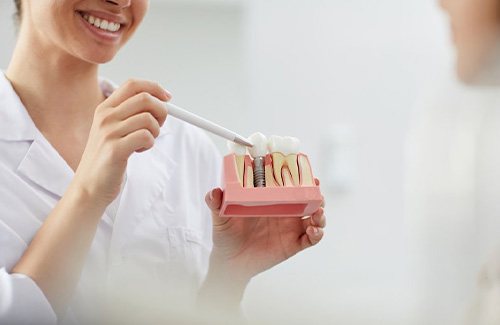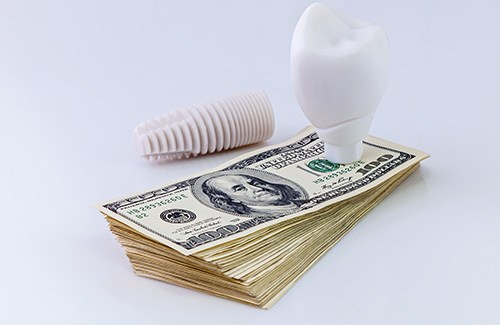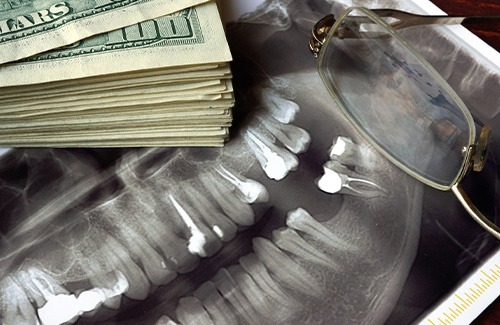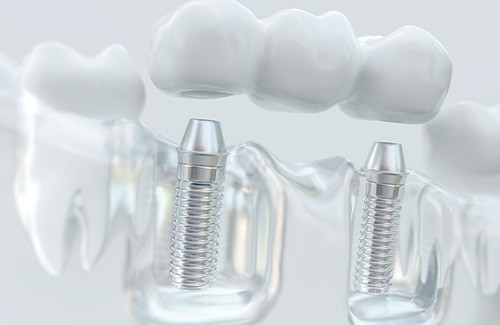Dental Implants – West Jordan, UT
Treating Tooth Loss with More Stable Solutions

When it comes to treating tooth loss, there are multiple options available to patients. However, those who prefer a more stable and durable solution can find hope in dental implants. Designed to fuse with the jawbone and remain in place for 30+ years, these prosthetics allow individuals to enjoy life with greater ease. Our team at Frandsen Dental of West Jordan invites you to call us to schedule a consultation to discover how you can get started with dental implants in West Jordan and prepare for a future of better oral health.
Why Choose Frandsen Dental of West Jordan for Dental Implants?
- In-House Dental Implant Placement
- Enhanced Imaging for Accurate Implant Placement
- Sedation Dentistry Available
What Are Dental Implants?

Dental implants are an advanced form of tooth replacement that uses titanium to fuse with the jawbone. As permanent fixtures within the mouth, they support custom restorations that are designed to offer greater function, aesthetics, and oral health. Their ability to remain in place for decades and even a lifetime makes them an attractive solution for tooth-loss sufferers.
The 4-Step Dental Implant Process

The process for getting dental implants is a little more complicated than those of traditional restorations like bridges or dentures, meaning that it also takes much longer. However, when you think about just how beneficial dental implants are for your oral health, as well as the effective job they do at replacing your teeth, this several-month period is well worth the wait. Though every treatment differs, here’s a closer look at the four main steps you can expect during the process of restoring your smile with dental implants.
Initial Dental Implant Consultation

The very first step in reconstructing your smile with dental implants is attending a consultation here in our office. During this appointment, we’ll closely inspect your jaw, teeth, and all other oral structures to ensure that you’re a good candidate for dental implants. This normally involves taking X-rays as well, to properly assess the density of your jawbone and ensure your gum tissue can healthily host implants. Some patients might need to undergo preliminary procedures, like a dental bone graft or periodontal therapy, before they can have their implant surgery scheduled.
Dental Implant Surgery

You’ll be happy to hear that we can complete the entire dental implant surgery here in our West Jordan office! This saves you quite a bit of time and effort in the grand scheme of things. This process is fairly straightforward, too. After numbing your mouth, we’ll make small incisions in your gum tissue to access your jawbone; the number of incisions depends on how many implants you’re getting. The posts are inserted at precise locations and angles, and then your gums are sutured shut. To maintain their shape and to shield your implants, a protective cap is often placed over them.
Dental Implant Osseointegration & Abutment Placement

You’ll spend the next three to six months healing; this recovery period is incredibly important because of a process called osseointegration. It refers to when your implant posts actually fuse with your bone tissue, which is what allows them to provide your future restoration with such impressive stability. Once osseointegration is complete, you’ll return to our office to receive your abutments, which are placed on top of your implant posts. These eventually secure your personalized restoration!
Delivery of Dental Implant Restoration(s)

Your replacement teeth will be designed based on impressions of your natural smile, meaning that we can promise they’ll look and feel as close to your original pearly whites as possible. These restorations are also fully customized for patients missing any number of teeth, anywhere in their mouths. We will make sure that everything functions as intended before sending you out into the world to enjoy your brand-new smile; and we’ll also be here to help you maintain it moving forward!
Benefits of Dental Implants

Unlike traditional dental bridges and dentures, dental implants are the only tooth replacement solution that can replace more than just the crowns of teeth. Instead, they go beneath the gumline to restore the complete root-to-crown structure. This allows for all sorts of different benefits. Continue reading to learn about some of the most prominent ones.
Day-to-Day Benefits

Dental implants look and feel just like natural tooth enamel. You shouldn’t notice a difference between them and your natural teeth. Here are some of the benefits that you can experience every day:
- Increased Bite Force: Dental implants allow for additional stability. You don’t need to shy away from tougher foods. You can expect them to restore up to 90% of your natural bite force.
- Easy to Maintain: Implants can be treated just like natural teeth. You shouldn’t have to make any changes to your diet or oral hygiene. Just brush twice, floss, and rinse with mouthwash on a daily basis.
- Increased Confidence: Dental implants blend in seamlessly with the rest of your smile, so they will look just like your natural teeth. You can enjoy a newfound confidence.
Health Benefits

In addition to daily benefits, your health will positively be affected by your dental implants. Here are some of the benefits you can look forward to:
- Improved Oral Health: Dental implants help to prevent additional oral health issues from developing, like gum disease and additional tooth loss.
- Better General Health: Having excellent oral health will positively influence your general health. It lowers your risk of serious medical conditions, including diabetes and cardiovascular disease.
- Prevents Bone Loss: Dental implants stimulate the jawbone, preventing bone loss from taking place over time.
Long-Term Benefits

By choosing dental implants, you are making an investment in the future of your smile. Here are some of the incredible advantages you can experience for many years down the road:
- Long-Lasting: With excellent maintenance, dental implants can last for multiple decades or the rest of your life.
- Successful: Dental implants have an astonishing success rate of over 95%. Failure is highly unlikely.
- Save Money: You don’t need to worry about buying adhesives or soaking solutions when you have dental implants. They also don’t require frequent repairs or replacements. Dental implants reduce your risk of developing oral health issues, so you can save time, discomfort, and money.
Dental Implants Post-Op Instructions

You should expect to undergo a healing process after receiving your dental implants. During your consultation, we’ll walk you through what to expect following your procedure and the steps you can take to ensure a smooth recovery. Don’t hesitate to notify our team about any questions or concerns you may have, as we also want you to be comfortable and confident about your treatment. Read on to learn some of the common dental implant post-op instructions to consider.
What to Do Directly After Dental Implant Surgery

Once you’ve undergone the surgical portion, you’ll need to allow for the blood clot to form around the implant site so that it can heal properly. Other than getting plenty of rest (while keeping your head elevated), you’ll also want to keep the following tips in mind:
- Avoid spitting; use a clean tissue or swallow your saliva instead
- Do NOT smoke right after your treatment is finished
- Refrain from drinking through a straw; the suction can disturb the surgical site
- Keep your fingers and tongue away from the implant
Common Side Effects When Recovering from Dental Implant Placement

Most patients are bound to experience some mild side effects within a few days following their surgery. The most common ones include:
- Swelling: Inflammation typically occurs around the first 72 hours after the treatment. Make sure to use a cold compress to alleviate swelling.
- Bleeding: It’s normal to experience mild bleeding for a few days after the procedure, and you can easily manage it with clean gauze and light pressure.
- Discomfort: Minor soreness around the implant site is typical and can be alleviated with over-the-counter/prescribed pain medications.
Your Diet After Dental Implant Surgery

Since you won’t want to disturb the implant site, your diet after surgery should only include soft foods that don’t require much or any chewing. These can include:
- Yogurt
- Pudding
- Applesauce
- Pasta
- Scrambled eggs
- Mashed potatoes
Post-Op Health & Oral Hygiene

In many cases, patients can brush their teeth the day after their procedure. Just be careful when scrubbing around the surgical site so as not to disturb the blood clot that’s forming. When rinsing your mouth, use salt water to keep the area disinfected and allow the mouthwash to pour from your mouth; don’t spit it out. Also, make sure to avoid using mouthwash that contains alcohol, since this can irritate the surgical site.
What to Do After Your New Teeth Are Attached

Once your new teeth are placed, the tough part is over! Our team will provide you with your custom dental crown, bridge, or denture and ensure that it’s a perfect fit for your mouth. You may expect some sensitivity or soreness when first wearing your restoration/prosthetic, but this should only be temporary. You can even take pain relievers to minimize discomfort if necessary. Practice great oral hygiene and visit your dentist every six months, and you’ll be good to enjoy your new smile for a long time!
Maintaining & Caring for Your Dental Implants

After investing your valuable time and money in the dental implant process, it’s only natural to want them to last. The good news is that they can last for three decades or more with proper care! So, make sure to keep the following in mind:
Make Oral Hygiene a Priority

Although your dental implants can’t decay, any natural teeth you have certainly can! Plus, your gums can develop an infection if you don’t consistently brush, floss, and rinse with mouthwash. That’s why it’s so important to make each of these steps a priority.
Tip: If you have a question about your oral hygiene regimen with dental implants, get in touch with us! We can give you a refresher on proper techniques and even share recommendations on which products are best.
Eat a Well-Balanced Diet

While there technically aren’t any dietary restrictions with dental implants, there are foods that are more difficult to eat or increase your risk of a dental emergency. Hard pretzels, chewy meats, raw nuts, and marshmallows are a few examples. Instead, fill your meals with foods that will benefit your oral and overall health, like oatmeal, mashed sweet potatoes, hard-boiled eggs, and plain yogurt.
Break Bad Habits

Using tobacco products can wreak havoc on both your oral health and your dental implants, which is why patients are encouraged to quit. Of course, that’s not the only bad habit you should break. Biting your nails, chewing on ice cubes, and using your teeth as tools to open things can also lead to serious damage, so make an active effort to adopt healthier habits instead!
Protect Your Dental Implants

Do you grind or clench your teeth at night? Do you like to stay active by running, lifting weights, riding your bike, or rollerblading? If you answered “yes” to either of these questions, then talk to us about having a custom mouthguard made! This will help prevent chips and cracks from consistent pressure or an unexpected fall.
Schedule Regular Dental Checkups

Patients often assume that they don’t need to come in for routine checkups and cleanings if they don’t have any of their natural teeth left. That’s not the case! After all, it’s still possible for periodontal disease, oral cancer, and other serious conditions to develop, which we need to detect and treat in the early stages. Plus, these routine visits ensure that we can assess the condition of your dental implants, reducing your risk of a dental emergency in the process.
Understanding the Cost of Dental Implants

Many patients are intimidated by the cost of dental implants, and they in fact are more expensive than other methods of tooth replacement. However, we still want to make the care that you need as affordable as possible.
We’ll be sure to give you a complete estimate of what you can expect to pay before you get your dental implants from us, and until then, here’s what you should know about how to make this treatment fit your budget.
Preliminary Treatments & Dental Implant Surgery

Preliminary procedures like gum disease treatment, extractions, or bone grafting can increase the overall cost of dental implants but are essential for long-term success. Fortunately, some of these treatments may be partially covered by insurance. The implant surgery itself involves separate costs, including placement location and sedation type. We handle the surgery in-house, which simplifies the process and avoids extra fees for outside specialists. This means that you won’t encounter any surprises when it comes time to pay for your treatment.
The Parts of Your Dental Implant

The cost of a dental implant itself is influenced by several factors:
- Number of implants: A single implant costs less than multiple implants, but using 4-6 implants for a denture is more cost-effective than replacing each tooth individually.
- Type of restoration: Crowns, bridges, and dentures vary in cost, with smaller restorations generally being less expensive.
- Size and material: Implants can differ in length or material, such as zirconia or titanium, which impacts the cost.
- Brand: Different manufacturers offer implants with specific features, affecting price based on individual needs.
How Dental Implants Can Save You Money/ How Dental Implants Pay for Themselves

Dental implants can save money long-term by reducing the need for frequent replacements or repairs associated with other options like dentures or bridges. Implants are durable, often lasting a lifetime with proper care, minimizing ongoing maintenance costs. They also help preserve jawbone structure, preventing bone loss that could lead to more costly procedures in the future. Additionally, implants maintain proper bite alignment, reducing the risk of dental problems that might require treatment down the road, such as misalignment or gum issues. Ultimately, they offer a stable, long-lasting solution that lowers overall dental expenses.
Does My Dental Insurance Cover Dental Implants?

Dental insurance coverage for implants varies by plan. While many insurance plans may not fully cover the cost of implants, they might cover parts of the procedure, such as preliminary treatments (extractions, bone grafting) or the restoration (crown, bridge). Some plans offer partial coverage or a lifetime allowance specifically for implants. It’s important to check your insurance benefits carefully. We recommend reaching out to your provider to understand what’s covered and how much of the total cost they will contribute, as policies can differ significantly.
Making Dental Implants Affordable

We also know that some of our patients are uninsured, and as a consequence we offer several methods of making care more affordable. For one, we have an in-house membership plan that can afford you substantial discounts on many of the services you receive from us, in addition to complimentary preventive services.
We also frequently work with third party financiers like Cherry, which can allow you to split the cost of your treatment across several monthly payments. If you have any questions about how you can make the services you receive from us fit your budget, please don’t hesitate to reach out to us!
Dental Implants FAQs
Does Getting Dental Implants Hurt?
The first thing to know is that your jawbone won’t have many nerve endings, so you should expect to experience significantly reduced discomfort from the process. Furthermore, our team will make sure to numb the area we’ll be working on with a local anesthetic so that you’re pain-free throughout your surgery. We can even provide sedation dentistry to ensure you’re relaxed and comfortable. The surgery itself shouldn’t hurt, but you might feel some soreness a few days after your visit. This can be managed with pain relievers and/or a cold compress to alleviate swelling and pain. If anything worsens after three days, notify us right away for help.
Am I Too Young to Get Dental Implants?
Most patients who receive dental implants will need to be older than 18 years old. Placing titanium posts into the jaw before it’s fully matured can end up interfering with the rest of the bone’s development and might increase the risk of certain complications. In many cases, people’s jaws won’t completely mature until they’re young adults, whereas some won’t fully develop until their mid-20s. Our team will review your situation to determine if you’re eligible for dental implants as well as any steps you can take to get there.
How Long Do Dental Implants Last?
Dental implants can potentially last several decades to a lifetime, as long as you practice proper maintenance. At the very least, you’ll need to make sure to brush, floss, and rinse with mouthwash every day to keep your smile clean of debris and harmful bacteria. You’ll also want to visit your dentist every six months for checkups and cleanings so they can monitor your progress as well as address any oral health issues that might be detected, such as decay and gum disease. Make sure to also avoid particularly sticky or hard foods, as they can ruin your restorations.
Can I Get Dental Implants If I’m Diabetic?
Yes! As long as you’re able to keep your diabetes under control, you should have an equivalent chance of dental implant success as those who are nondiabetic. Having unchecked diabetes can potentially slow down recovery and cause the dental implants to have more difficulty integrating with your jawbone. That’s why, if you’re diabetic and want to replace missing teeth with dental implants, you’ll need to speak with your endocrinologist or primary care physician to see how you can keep your blood sugar levels in check before moving forward.
